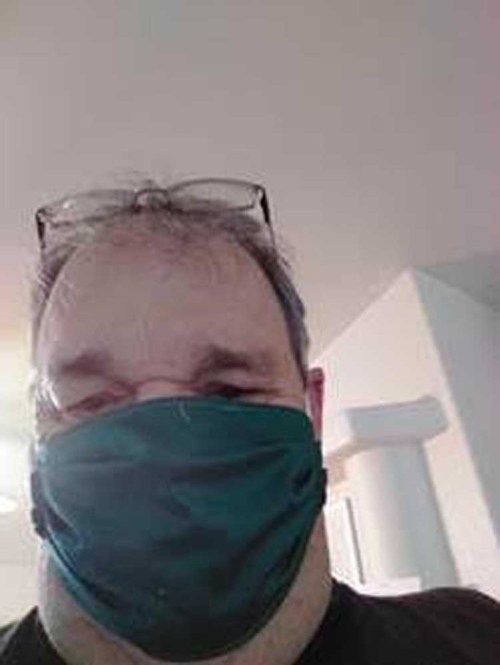Local group continues to provide masks
Published 5:00 am Wednesday, April 22, 2020

- Michael Dettmer, a direct support professional with Horizon Project in Milton-Freewater, wears a mask sewn by volunteers at Mama Bear's Quilt Shop in Stanfield.
UMATILLA COUNTY — At a time when many family-owned small businesses have temporarily closed, one niche business in Stanfield has found itself busier than ever.
Mama Bear Quilt Shop, a quilting shop owned by Kristi Ray and her husband, Chad, is making face masks for first responders, hospitals and others who risk exposure to COVID-19 every day. Since ramping up production of the masks about four weeks ago — give or take — the group has made and donated about 4,000 masks, including 400 to Good Shepherd Hospital in Hermiston, 370 to St. Anthony Hospital in Pendleton and 300 each to Astria Toppenish Hospital and the Washington State Penitentiary.
Needless to say, the group, which is made up of sewers from Stanfield, Hermiston, Echo and Pendleton, has been busy.
“They come in here every day, they’re exhausted,” Kristi Ray said. “They’ve been working nonstop, but they keep coming. It’s amazing.”
Ray, who’s been in business in Stanfield since Oct. 2019, said the group is currently working on an order of masks for the U.S. Coast Guard.
“They’re going all over,” Ray said of the masks.
One local agency that benefited from an order of masks is the Horizon Project, with headquarters in Milton-Freewater and additional offices in Pendleton and Hermiston.
The Horizon Project recently received 300 masks from the Mama Bear Quilt Shop group.
“We are so grateful for this donation,” said Cheryl Davis, a registered nurse with Horizon Project. “It has relieved a lot of our need and a lot of stress of being able to protect our staff and our clients.”
The Horizon Project, which has been around since the late 1970s, provides residential, employment and social support to adults with intellectual and developmental disabilities. Dr. Terri H. Silvis, the chief executive officer for Horizon Project, said they have 20 group homes throughout the county and employees called “direct support professionals” who are in the homes every day, 24 hours a day, seven days a week.
“They truly are home health care workers on the front lines doing everything from medication management and administration, to helping people attend doctor visits, helping them prepare food, making sure that they’re eating safely, because some people have special food preparations,” she said.
Davis said she came across a post on social media about Mama Bear Quilt Shop and the donation of masks. Knowing her organization was in need of masks — an order for them placed in January finally arrived in mid-April — she reached out to the group to explain the need. Davis said she ended up speaking with Chad Ray, who was familiar with the Horizon Project from his time as a pharmacist in the area and doing flu shots for Horizon Project clients.
“I told them how many clients we have, how many direct support staff we had, and he said, ‘Well, how about I give you 300 now, and when we get caught up, we could talk about giving you more,’ so that we could have a second set for our staff. A ‘one to wear and one to wash’ kind of thing.”
Davis said some Horizon Project employees are working on making masks from kits to return the 300 masks to the sewing group and help replenish its supply.
“We’re supplying the people, but (Mama Bear Quilt Shop) supplied all of the materials, all of the kits and all of that,” she said. “We’re going to give them back the 300, or replenish them with 300 masks that they gave us.”
Silvis said some employees had started to make masks several weeks ago in anticipation of the growing need. She said Rosie Riggins, the office specialist in the Hermiston office, had made quite a few and exemplified the type of can-do spirit that permeates through Horizon Project.
“We are very blessed with some incredible team members,” she said.
Horizon Project has clients who work at a number of businesses, including Walmart, Safeway, Target and Subway, Silvis said, escalating the need for masks, something that wasn’t always the case in years past.
“Well, in our industry, it’s not historically common that we need masks,” Silvis said. “If a client is ill, they will get a mask from the doctor, or are supplied a mask from their physicians, typically, and Cheryl would keep a supply on hand for any staff members who would be directly supporting that person. But it didn’t come up that much really.”
For their part, Kristi Ray said the response of the sewers is seemingly par for the course in Eastern Oregon.
“If you ever needed anything and you were in Eastern Oregon and you put it out there, you know people will come through,” she said.









